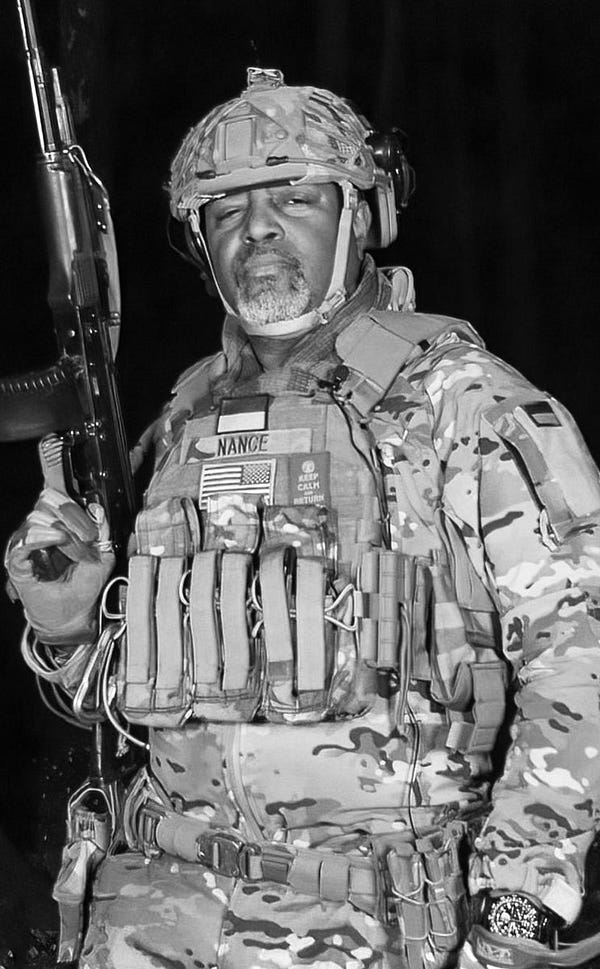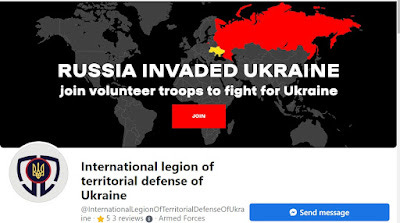What is the International Legion of Territorial Defense of Ukraine?
I was listening to a Mary Trump podcast on US politics featuring Malcolm Nance. At the first of the interview, they talk about Ukraine and Nance talks about how he's home from fighting in Ukraine and about his background in US Naval intelligence.
This made me wonder how this works. It turns out Vance is a member of the International Legion of Territorial Defense of Ukraine.
The name echoes the International Brigades of foreigners who fought in the Spanish Civil War on the Republican side. But since it's 2022, they have a Facebook page:
The Washington Post reported on this in April (Ex-MSNBC analyst joins Ukrainian forces against Russia: ‘I’m done talking' 04/19/2022):
Nance, 60, is a “globally recognized counterterrorism expert” with decades of experience in U.S. intelligence, according to his author biography. Nance, executive director of the Terror Asymmetrics Project, a think tank focusing on terrorism and defense, previously deployed on intelligence operations to the Balkans, the Middle East and sub-Saharan Africa, his author biography says. ...
“The international legion is one of the best-kept secrets in the country,” Nance told the Daily Beast. “I was very touched when I met the first platoon and saw they were here for the right reasons.”
The State Department has warned Americans that citizens traveling to Ukraine, “especially to take up arms,” face “profound risks … to their health, to their safety, their security.” State Department spokesman Ned Price said last month that U.S. citizens traveling to Ukraine to fight against the Russians “face significant risks, including the very real risk of capture or death.”
This raises a question if this is a way for NATO governments to involve some American and other NATO forces directly in the the war with the "international legion" as a cover. It's also not clear to me what the legal status of such foreign fighters would be if captured. Under international law, mercenaries can tried as criminals and are not required to be treated as prisoners of war.
David Malet pointed out in March (The Risky Status of Ukraine’s Foreign Fighters Foreign Policy 03/15/2022):
But what will happen to those foreign volunteers when some are inevitably captured or killed? If Ukraine is enlisting foreign volunteers into its regular military, something it also did in the 2010s with the foreigners who joined nationalist militias to fight pro-Russian separatists, then they should have full rights as soldiers under the Geneva Conventions.
Under international law, when soldiers become noncombatants when wounded or captured, they are supposed to be protected from reprisals, torture, or degrading treatment as hostages, and they must be provided legal protections against collective punishment for acts of their country. However, mercenaries do not enjoy the same protections as lawful combatants, including the rights afforded to prisoners of war, and governments are free to treat them as they see fit.
The standards for identifying mercenaries are also arbitrary. Under international law, they are foreign participants in the conflict who are motivated primarily by personal gain. That motivation is difficult to prove or disprove for anyone. And there are in fact some soldiers for hire among the number of legionnaires who have traveled to Ukraine, blurring the distinction. Moscow even appears to be importing its own mercenaries from Syria. But Russia can claim it is following international law in any actions it might take against foreign legionnaires if they are not regarded as legitimate soldiers. [my emphasis]
Malet notes that Russia has stated that any foreign fighters would be treated as mercenaries.
Andy Blanchard reports in Band of others: Ukraine’s legions of foreign soldiers are on the frontline Politico 03/25/2022:
Cpl. Damien Magrou, a spokesperson for the International Legion of Territorial Defense of Ukraine, says his fighting force is made of a large contingent of British, American and Polish volunteers.
Magrou, a Norwegian who has lived in Kyiv for several years, declined to provide specifics on the total number of legionaries or details on how many have come from which part of the world.
When it comes to qualifications, Magrou said a military background on its own isn’t good enough. The legion is looking for foreign fighters with live combat experience.
“What we want is for people to come that have already been in the line of fire,” he said.
For this reason, Americans with “concrete combat experience” are very attractive candidates.
He also reports, "Russian forces have appeared to target foreign volunteers." And what he relates about the Canadian position on its citizens serving in the International Legion suggests they are concern that foreigners in the Legion could be considered mercenaries:
The Canadian Armed Forces has instructed its members — including those in its regular force, reserves and those on leave — to stay away from the region.
Lt.-Gen. Frances Allen, Canada’s vice-chief of the defense staff, told a parliamentary committee Wednesday that the directive came from Chief of the Defence Staff Gen. Wayne Eyre. The only exception to the prohibition are personnel with approval from Eyre, she said.
Canada has warned would-be fighters about the risks of going to Ukraine’s conflict zone as well as the possibility the Russian regime could use the presence of Canadian mercenaries as part of the Kremlin’s propaganda machine. Allen warned that Russian disinformation may use the engagement of foreign fighters in Ukraine in “counterproductive” ways that could compromise the efforts of Ukraine’s Western allies.
There is also a separate group of Georgian citizens called the Georgian Legion.
The International Legion is something that could have significant "unintended consequences." We should recall that there were foreign fighters in Afghanistan assisting what the West then called "brave mujahadeen Afghan freedom fighters" against the Soviet forces. That brand of foreign legionnaires later became known as "jihadi terrorists."
There is also a question of what risks these international fighters raise for intelligence operations. Ukraine has been having its issues within its own government with Russian espionage operations. NATO has been sharing intelligence with the Ukrainian government. And security of "sources and methods" is always a concern. These international legions are presumably working closely with the Ukrainian armed forces, but without being part of the nation's military.
There's always a lot of gray areas in war. The presence of these international fighters provides some additional ones.





